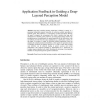Free Online Productivity Tools
i2Speak
i2Symbol
i2OCR
iTex2Img
iWeb2Print
iWeb2Shot
i2Type
iPdf2Split
iPdf2Merge
i2Bopomofo
i2Arabic
i2Style
i2Image
i2PDF
iLatex2Rtf
Sci2ools
297
click to vote
BICA
2010
2010
Application Feedback in Guiding a Deep-Layered Perception Model
Deep-layer machine learning architectures continue to emerge as a promising biologically-inspired framework for achieving scalable perception in artificial agents. State inference is a consequence of robust perception, allowing the agent to interpret the environment with which it interacts and map such interpretation to desirable actions. However, in existing deep learning schemes, the perception process is guided purely by spatial regularities in the observations, with no feedback provided from the target application (e.g. classification, control). In this paper, we propose a simple yet powerful feedback mechanism, based on adjusting the sample presentation distribution, which guides the perception model in allocating resources for patterns observed. As a result, a much more focused state inference can be achieved leading to greater accuracy and overall performance. The proposed paradigm is demonstrated on a small-scale yet complex image recognition task, clearly illustrating the adva...
BICA 2010 | Cognitive Science | Deep Learning Schemes | Promising Biologically-inspired Framework | State Inference |
Related Content
| Added | 12 May 2011 |
| Updated | 12 May 2011 |
| Type | Journal |
| Year | 2010 |
| Where | BICA |
| Authors | Itamar Arel, Shay Berant |
Comments (0)

